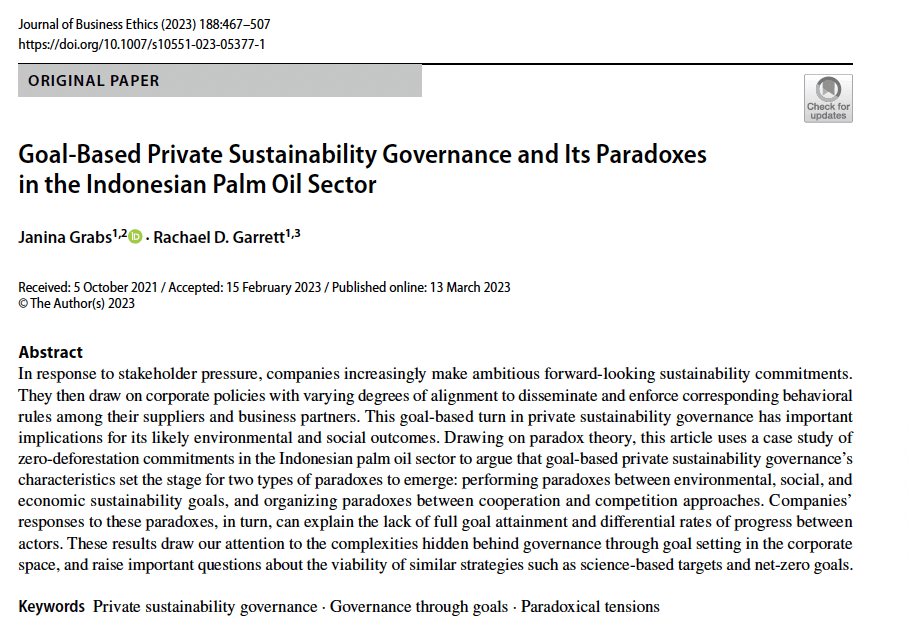︎

Rachael D. Garrett
Environmental Policy Lab, Department of Humanities, Social and Political Sciences, ETH Zürich
Rachael Garrett is an Assistant Professor of Environmental Policy at ETH Zürich (Switzerland). Dr. Garrett's research examines interactions between land use, ecosystem services, and economic development at multiple spatial and temporal scales to better understand the drivers and impacts of land change and the effectiveness of existing conservation policies and practices. She is particularly interested in how commodity supply chains interact with environmental institutions to shape land use processes, resource distribution, and trade. Her research has largely focused on land change processes in agriculture-forest frontiers and sustainable intensification of pastures in the tropics. More recently she is leading a pan-tropical analysis of the effectiveness and equity of forest-focused supply chain policies with funding from the Swiss National Science Foundation and an ERC Starting Grant. This work involves coordinated research in Brazil, Ghana, Indonesia, and Ivory Coast on beef cattle, cocoa, oil palm, and soybean supply chains. Dr. Garrett received her doctorate at Stanford University and did her post-doctoral fellowship at Harvard University. Prior to working at ETH Zürich she was an Assistant Professor at Boston University.
MORE ABOUT RACHAEL D. GARRETT >Apr 5, 2022
Sustainable Global Supply Chains Report 2022
Global supply chains affect the economy, the environment and social welfare in many ways. Worldwide, economies are experiencing global supply shortages today, affecting key industries such as automotive and consumer electronics as well as vaccine and medical supplies industries. These preoccupy poli...

Apr 1, 2022
R.D. Garrett, J. Grabs, F. Cammelli, F. Gollnow, S.A. Levy
Should payments for environmental services be used to implement zero-deforestation supply chain policies? The case of soy in the Brazilian Cerrado
Over the past decade public and private actors have been developing a variety of new policy approaches for addressing agriculturally-driven deforestation linked to international supply chains. While payments for environmental services (PES) have been advocated in many contexts as an efficient and pr...

Jan 1, 2022
Federico Cammelli, Samuel A. Levy, Janina Grabs, Judson Ferreira Valentim, Rachael D. Garrett
Effectiveness-equity tradeoffs in enforcing exclusionary supply chain policies: Lessons from the Amazonian cattle sector
To address ongoing deforestation for global food commodities production, companies and governments have adopted a range of forest-focused supply chain policies. In the Brazilian Amazon, these policies take the form of market exclusion mechanisms, i.e., immediately dropping suppliers who have cleared...

Sep 1, 2021
Janina Grabs, Federico Cammelli, Samuel A. Levy, Rachael D. Garrett
Desgning effective and equitable zero-deforestation supply chain policies
In response to the clearing of tropical forests for agricultural expansion, agri-food companies have adopted promises to eliminate deforestation from their supply chains in the form of ‘zero-deforestation commitments’ (ZDCs). While there is growing evidence about the environmental effectiveness ...

Feb 1, 2021
Rachael D Garrett, Samuel A Levy, Florian Gollnow, Leonie Hodel, Ximena Rueda
Have food supply chain policies improved forest conservation and rural livelihoods? A systematic review
To address concerns about the negative impacts of food supply chains in forest regions, a growing number of companies have adopted policies to influence their suppliers’ behaviors. With a focus on forest-risk food supply chains, we provide a systematic review of the conservation and livelihood out...

Jan 1, 2019
R.D. Garrett, H.K. Gibbs, B. Soares-Filho, R. Sarsfield, X. Rueda, R. Rivero, L.L. Rausch, J.C. Milder, S. Lake, S. Hall, B. Døvre, S. Levy, R. Barr, B. Ayre, Y. le Polain de Waroux, R. Heilmayr, P. Dauvergne, J. Clapp, J. Godar, T.A. Gardner, K.M. Carlson, N. Villoria
Criteria for effective zero-deforestation commitments
Zero-deforestation commitments are a type of voluntary sustainability initiative that companies adopt to signal their intention to reduce or eliminate deforestation associated with commodities that they produce, trade, and/or sell. Because each company defines its own zero-deforestation commitment g...

Jan 1, 2017
Ximena Rueda, Rachael D. Garrett, Eric F. Lambin
Corporate investments in supply chain sustainability: Selecting instruments in the agri-food industry
Private investments to address environmental issues are perceived as a powerful engine of sustainability. For the agri-food sector, multiple instruments have been developed to green supply chains. Yet little is known about the underlying process and conditions under which green sourcing concerns lea...

Mar 25, 2022
Janina Grabs, Federico Cammelli, Sam Levy, and Rachael Garrett
How to find synergies between effectiveness and equity when designing supply chain sustainability policies

Feb 12, 2024
Kate Macdonald, Rachael Diprose, Janina Grabs, Philip Schleifer, Justin Alger, Bahruddin, Ben Cashore, Paul Cisneros, Deborah Delgado, Rachael Garrett, William Hopkinson
Jurisdictional Approaches to Sustainable Commodity Governance
Jurisdictional approaches (JAs) have emerged over the past decade as a significant mode of sustainable commodity governance, particularly in tropical forest countries. JAs are characterized by multi-stakeholder initiatives with substantial government involvement, aiming to integrate environmental, s...
Mar 15, 2024
Janina Grabs and Rachael D. Garrett
Goal‑Based Private Sustainability Governance and Its Paradoxes in the Indonesian Palm Oil Sector
In response to stakeholder pressure, companies increasingly make ambitious forward-looking sustainability commitments. They then draw on corporate policies with varying degrees of alignment to disseminate and enforce corresponding behavioral rules among their suppliers and business partners. This go...

